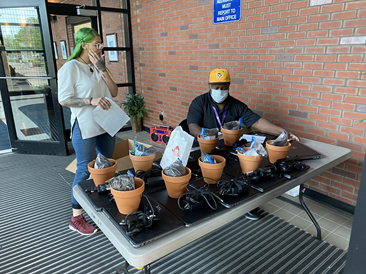Communities are the final judges of equity-based programming. As the Beyond the Laptops campaign continues to its next stages, it is important to reflect on community needs and stakeholder feedback.
The original Beyond the Laptops campaign goal was to connect Pittsburgh families who lacked hardware at home with devices that parents could use too. Since March, Beyond the Laptops distributed over 1,200 laptops and also provided internet to 1,000 Pittsburgh households.
COVID 19 and the Digital Divide:
In the midst of a pandemic, families were faced with the rapid digitalization of everyday tasks, including schooling, at the same time as they were encouraged to limit contact in the outside world.
A Lincoln elementary mother cited the challenges her family faced without devices during this time: most importantly, students couldn’t participate in online learning over Microsoft teams. They had to make many trips to school to pick up paper work packets, or try to borrow and share devices from friends whenever possible to complete assignments. Now, with devices in hand, this mother said she found the distribution process “quick and simple” and “I am more confident that my children will be successful and prepared for the next school year.”
Distribution Process:
Distributions focused on clients living in priority areas (Homewood, Hill District, Hilltop, Hazelwood, North Side), who were receiving social support services from a vetted partner organization. It primarily served students but also folks requiring workforce support.

To distribute devices, some organizations delivered computers door to door; others had central pickups. This included the Department of Human Services and Homewood Children’s Village, the latter of whom also distributed Grow Pittsburgh Grow kits at the same time as pictured. For laptops going to the families of Pittsburgh Public School students, Beyond the Laptops only served those grades who hadn’t yet been served by PPS (6th grade and under at the end of April) and collected PPS student ID numbers to reconcile with the PPS distribution list. This ensured that nobody received extra devices while need was unmet elsewhere.
The impact was tremendous. PPS 4th grade math teacher, Miss Henderson, discussed how digital resources enhanced her classroom: “The new technology in the hands of my scholars has completely changed my ability to teach during this time. Before, [I had to call] students one at a time to work through skills from their paper based workbook. This has allowed me to deliver my lesson to all students at the same time, thus allowing me to spend the rest of my time supporting students on their practice problems and connecting with families.”
A mother of a Uprep student similarly expressed relief in change brought by a device, “It was a blessing receiving the laptop because it was a struggle every day for [my daughter] having to go over to her grandmother’s house just to be able to log in for schooling. It was taking away from her personal time as a kid having to commute from house to house for computer use. It has made it so much easier on me as a single working mother of two and one being a small child.We are now able to stay home in the comfort of our own home and get school work done and done in a timely manner with us having our own device.”
Across the board, families reported that the devices saved time, increased access to schooling, gave kids safe activities to do indoors, and reduced the homework gap.
Partnerships:
Recognizing the immediate need for devices, an online form for community partners was released just two days after area COVID closures. Upon release, computers were $125 a piece, but the price was driven down to zero as the Beyond the Laptops fundraiser closed the gap.
CIRCLES of Greater Pittsburgh began to gather laptops at the onset of the COVID crisis. As Executive Director Tammy Thompson explains, partnering with Beyond the Laptops saw more families served, “We were so happy to see Computer Reach and Neighborhood Allies partnering to get many more computers into these homes and we knew that we could get some into the hands of waiting families. We started a survey in March to assess the needs of families and last week, we had 182 families on our list. Thanks to Neighborhood Allies and Computer Reach 50 of those families will receive laptops.”
Nadine Masagara-Taylor, Executive Director of The Corner, said of her community organization’s involvement, “The Beyond the Laptops program is an essential resource for youth and families. Through this initiative, we have connected 30 youth and adults to laptop computers, affordable WIFI options and free technology help services. This program has created an equitable pathway for neighbors to access digital academic tools, employment responsibilities/opportunities and vital social service resources.”
In addition to the community partners that carried out distribution, stakeholders helped acquire hardware, subsidize devices, and provide long-term support to closing the digital divide.
Computer Reach and 75 volunteers refurbished devices for distribution. All recipients could access IT Help from the University of Pittsburgh’s Virtual IT Help Desk, which covered everything from setting up the computer to learning how to run key programs like Teams.
Author: Maura Kay, Neighborhood Allies Program Research Associate
